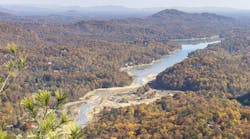Going to the Mattresses
On Monday, June 29, 18 states filed lawsuits with the intention of blocking the Waters of the U.S. (WOTUS) rule, which attempts to clarify what water bodies the U.S. Environmental Protection Agency (EPA) can regulate under the Clean Water Act.
The states filed lawsuits in three separate groups in different federal courts, based in Bismarck, N.D.; Columbus, Ohio; and Houston.
The attorneys general for Texas, Louisiana, and Mississippi filed a joint lawsuit in a Houston federal court, asserting that the EPA’s final rule violates the Clean Water Act’s language and is a federal power grab. While the EPA has the authority to regulate water quality, the suit says Congress has not granted the EPA the power to regulate water and land use.
“The EPA has redefined ‘waters of the U.S.’ in order to gain greater authority and power over private land,” Nebraska Attorney General Doug Peterson said in a statement about the lawsuit he filed with leaders in Alaska, Arizona, Arkansas, Colorado, Idaho, Missouri, Montana, Nevada, New Mexico, North Dakota, South Dakota and Wyoming.
EPA has made efforts to explain the specifics of WOTUS through blogs and other outreach; a document on its website lists “Facts About the WOTUS Proposal” that describe what is and what is not covered, and states that EPA is not asserting regulatory authority over land use.
The Clean Water Act gives EPA jurisdiction over “navigable” water, but it also must regulate a certain distance upstream to protect the main waterways. If a waterway is under federal jurisdiction, landowners might need permits for anything that negatively affects water quality. EPA has stated that if you didn’t need a permit before, you won’t need one now.
The new rule covers about 3% more area, but the protections are still smaller than they were during President Bill Clinton’s administration.
While these are the first examples of states suing, these lawsuits may not be the last; businesses, farm and agriculture lobbies, and industry all have opposed the rule. The House voted to overturn the rule, and the Senate Environment and Public Works Committee passed a bill to overturn it while instructing EPA on how it should be rewritten. Stay tuned.

